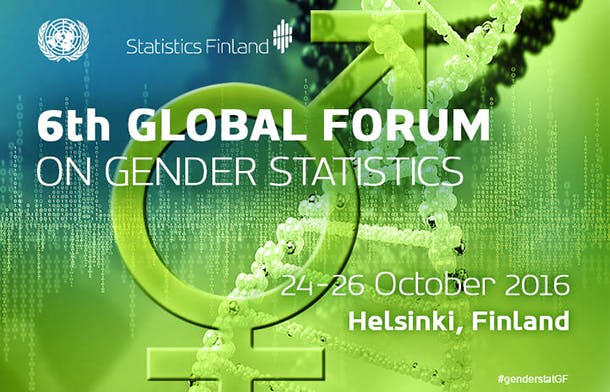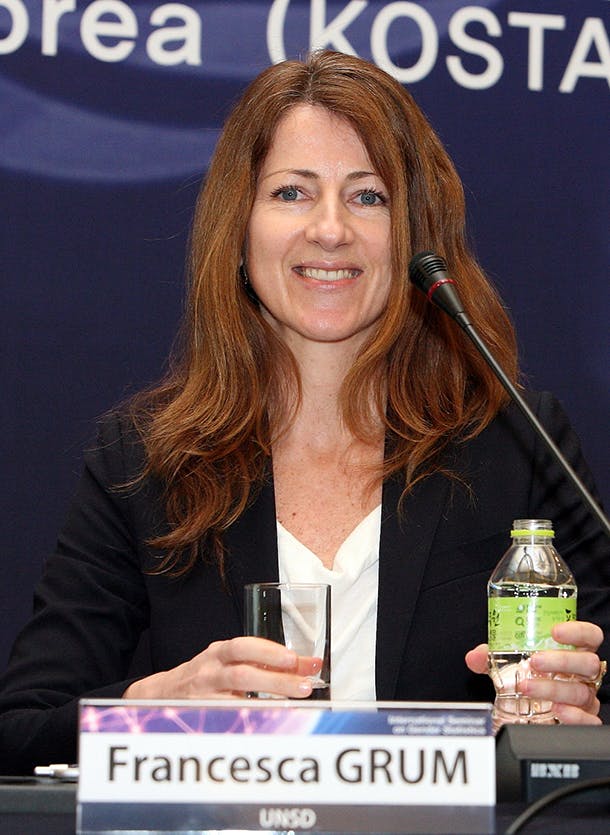
In the midst of mounting interest in gender data comes the 6th Global Forum on Gender Statistics which is taking place in Helsinki from October 24-26. Over 200 participants will attend the Global Forum, including representatives from United Nations agencies, other international organizations, civil society, academia, and national statistics offices.
Data2X will be at the Global Forum and took the opportunity to sit down with Francesca Grum, the Chief of Social and Housing Statistics at the UN Statistics Division, Secretary of the Inter-Agency Expert Group on Gender Statistics, and in charge of the Global Forum, to learn more about the history of the Forum and the goals of this year’s gathering.
Data2X: Why was the Global Forum on Gender Statistics created?
Francesca Grum: In 2007, the UN Statistical Commission asked us [the Inter-Agency Expert Group on Gender Statistics] to create this forum as an opportunity to bring together everyone who works on gender statistics. This is key. Many technical meetings take place throughout the year, but this forum provides a platform to get “data users” (such as governments) to talk to “data producers” (such as statisticians).
By bringing together the policymakers – who can explain how they are using data and where they perceive there to be gaps – with the researchers, we can better assess whether our technical approaches are working, and where we need to think outside the box to come up with new ways of measuring and collecting data. The Global Forum truly gives us an opportunity to move from disseminating data to communicating data.
Data2X: What are the specific goals for this year’s Global Forum?
FG: Since the Sustainable Development Goals were adopted a year ago, all of our work centers around their indicators. Specifically, we will be looking at the indicators with a gender lens to figure out how we can ensure that the best data will be available to monitor progress toward achieving the goals. Note that we are not just focusing on Sustainable Development Goal 5; we are focusing on every indicator that is relevant for gender issues. As part of this process, we will focus heavily on the challenges faced by National Statistics Offices. We want to understand what data is currently available and can be produced as required by the Sustainable Development Goals.
What is important to recognize is that many of the dimensions that have been agreed upon for the Sustainable Development Goals are new measures; i.e., we don’t have methods to capture the data that is needed. We won’t come out of the forum with full agreement on measurement methods because there are so many topics to cover in a short time, but there will be some side meetings where we will have deeper conversations about methodology and priorities mapping.

Data2X: Are there data achievements that have resulted as a direct success of past Global Forums?
FG: Yes! Some of the methods we are proposing to measure violence against women, time-use statistics, and emerging issues for gender analysis such as assets ownership and entrepreneurship, were developed as direct outcomes of past forums. We saw that the data countries were producing on these issues was insufficient. This led our researchers and statistical community to develop new methods to capture these phenomena.
Data2X: Does the Global Forum on Gender Statistics have relevance for ordinary citizens?
FG: The efforts of the Global Forum are important to anyone who cares about women’s issues. Our goal is to examine what evidence is available for women in comparison to men and where we stand in our long-term goal to achieve gender equality. The forum gives us a chance to hear the stories behind the data; both in terms of what has worked for specific countries to make measurable improvements for women, as well as policy best practices and lessons that other countries can use.
All good policy is based on data, so if you care about good policies for women, policies that promote gender equality, policies must be informed by good gender statistics!
Data2X: Gender data has recently gained widespread appeal, but you have been working in this area for a long time. How can this new interest complement efforts that been underway for many years?
FG: I am thrilled that there is so much interest in gender data and statistics. For an agency that has been producing gender statistics for over 30 years, this is very exciting! We need to channel this new interest in a smart way, so that efforts aren’t duplicated.
We are hoping to use the Global Forum to talk about bridging our long-standing methods with new initiatives. We use more traditional approaches to produce gender statistics through national statistics offices, and now we can complement our efforts with the many new instruments and initiatives that will draw on different sources of data.
Because of this current interest in gender data, this year’s Forum will have a good presence from donors. Our challenge is making sure that donors understand that this is a process, it’s not a new issue, and that it will take time to develop the best methods to collect good gender data.



 View All Blog Posts
View All Blog Posts